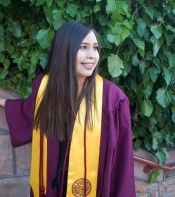Impacts of COVID-19 pandemic help shape College of Health Solutions grad’s future
Editor’s note: This story is part of a series of profiles of notable spring 2023 graduates.
Among the many lessons learned during the COVID-19 pandemic, one stood out for College of Health Solutions graduate Aryana Gonzales.
Actually it just reinforced a fact that Gonzales already suspected to be true. Conditions such as those caused by the COVID-19 pandemic have a disparate impact on marginalized groups.
Gonzales, from Nogales, Arizona, wanted to find out why, which helped her decide on pursuing a Master of Science in health care delivery.
“My program is an interdisciplinary field that addresses the complex needs of our current health care system in the U.S.,” Gonzales said. ”I became more curious about how our social determinants impact our overall health and future health outcomes.”
Question: What’s something you learned while at ASU — in the classroom or otherwise — that surprised you or changed your perspective?
Answer: One lesson that changed my perspective is that our laws reflect our values. I find myself thinking about what constituents' values are when a legislator is proposing a bill and if these are true reflections. I used to believe that our states were united, but we all have our own beliefs and are incredibly individualistic, and this has helped me understand why there is currently a divide in our country.
Q: Why did you choose ASU?
A: I chose ASU due to its contributions to research and curious minds who want to better understand and aid the world for the better.
Q: Which professor taught you the most important lesson while at ASU?
A: The professor that taught me the most important lesson was my capstone faculty mentor, Dr. Elizabeth Kizer. She taught me that we need to connect with others and find our support system where we can, as well as — even though we might both be from a rural town — we can make it anywhere just like anyone else.
Q: What’s the best piece of advice you’d give to those still in school?
A: Don't be afraid to ask questions. The world is a very confusing place, and wanting to know more and the reasons why have helped me see the world differently. Continue thinking outside the box! We complete systematic change together.
Q: What was your favorite spot on campus, whether for studying, meeting friends or just thinking about life?
A: My favorite spot to study is the TA/graduate student workspace in Health South (on the Downtown Phoenix campus) on the fourth floor.
Q: What are your plans after graduation?
A: I am currently researching accelerated nursing and physician assistant programs. I am ready to bring my lessons to care for the population that should be at the center of the health care system: the patients.
Q: If someone gave you $40 million to solve one problem on our planet, what would you tackle?
A: I would do anything I can to ensure housing for all. The amount of heat-related deaths in Maricopa County is continuously increasing every year, along with housing prices. I would try to build as many cooling resilience hubs containing community gardens around the Valley as the first step.
More Health and medicine

Making medicine side-effect free
Many drugs that address medical conditions can come with serious side effects. In drug commercials, the litany of potential side…

Diagnostic research happening at ASU focused on detecting diseases earlier to save lives
It was one of America’s founding fathers, Benjamin Franklin, who may have foreshadowed today’s health care innovation when he…

Fighting the fungus among us
It starts with a spore.When inhaled, spores of the coccidioides fungus can cause coccidioidomycosis — better known as valley…


